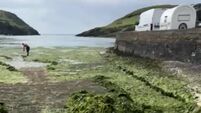'At 16 my ambition was to die, Cork Life Centre saved me'

Bullied mercilessly, Amber Sheridan O’Callaghan found secondary school unbearable. She dropped out of school, and began hanging around with people who had a bad influence on her, was sexually assaulted at 16, but attending Cork Life Centre ‘saved my life’. She is now studying psychology at Waterford IT. Picture: Larry Cummins
“If it wasn’t for the Life Centre, I don’t know where I’d be,” says Amber Sheridan O’Callaghan. “If you asked me at 16 what I wanted to be, I probably would have said ‘Dead, if I’m lucky’.”
Bullied mercilessly, Amber found secondary school unbearable. She dropped out of school, and began hanging around with people who had a bad influence on her. At 16, Amber suffered a sexual assault, something which had a devastating effect on her.













